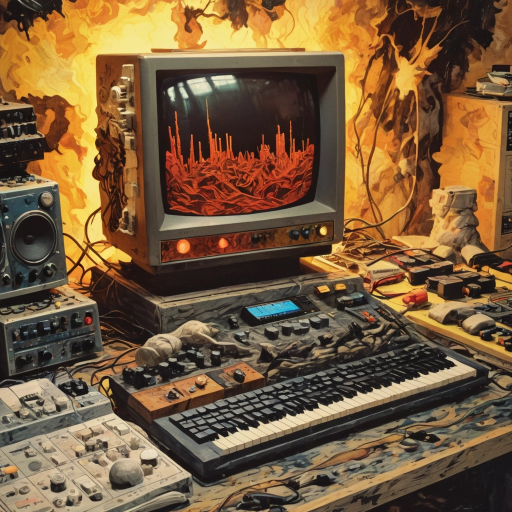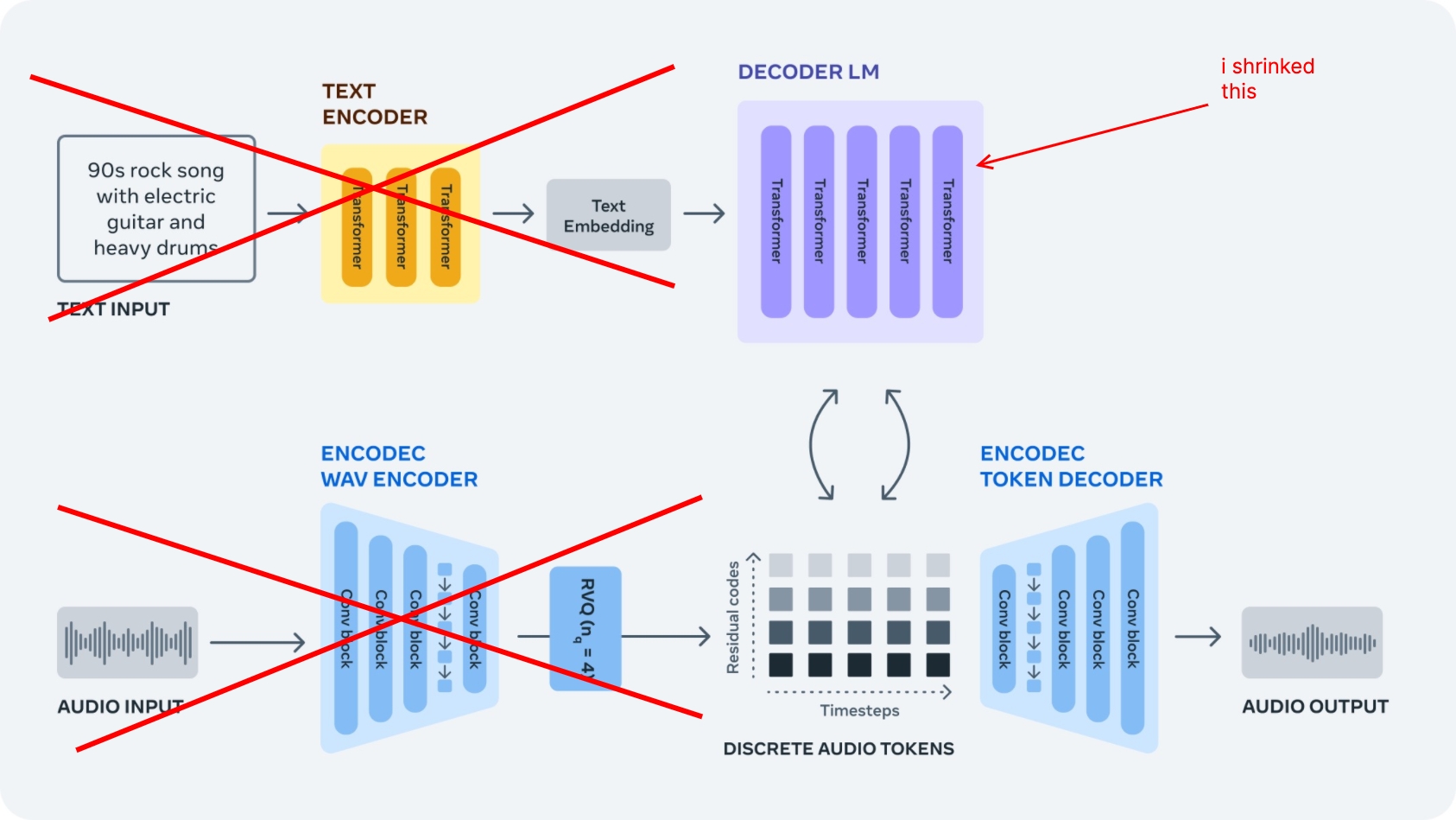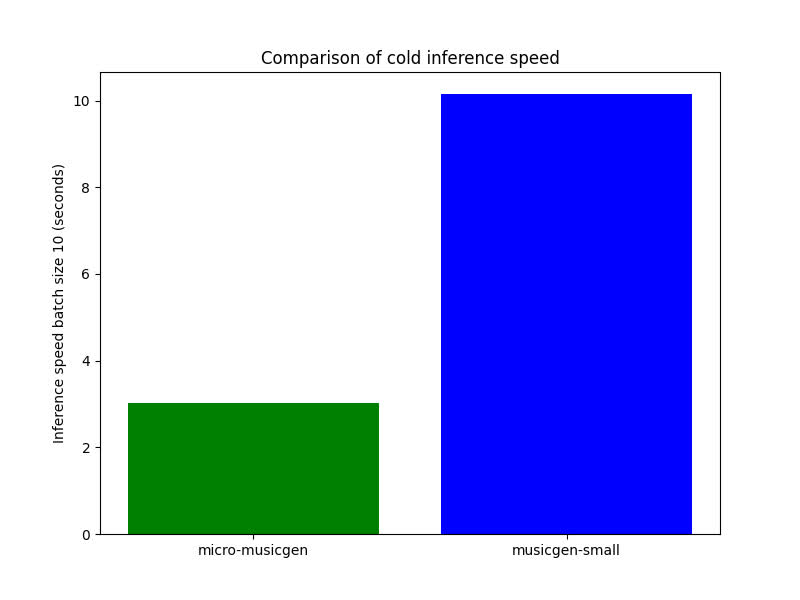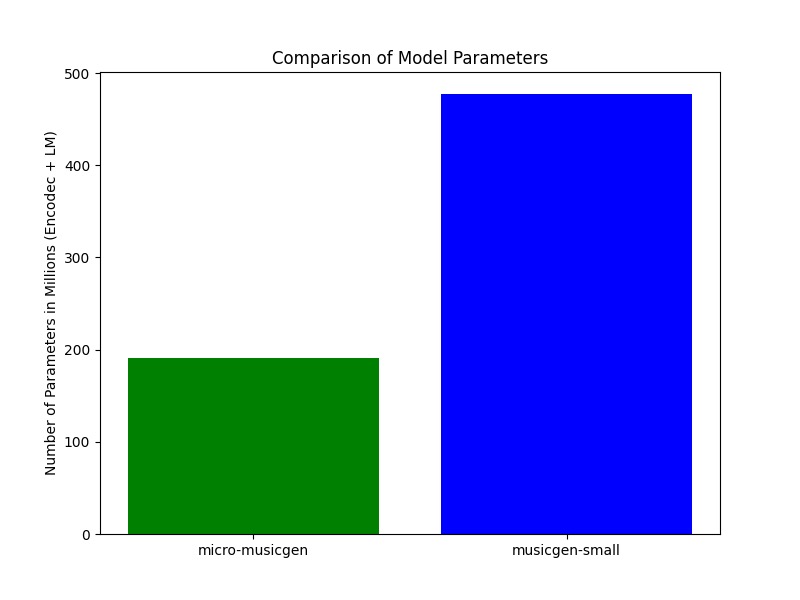A new family of super small music generation models focusing on experimental music and latent space exploration capabilities.
Warning
WARNING: These models WILL sound bad to a lot of people. The goal is not create pleasant sounding music, but to spark creativity by using the weird sounds of Neural Codecs for music production and sampling!
- micro-musicgen-jungle
- micro-musicgen-acid
- ...more coming soon
If you find these model interesting, please consider:
My main goals for these models was to be able to train and run from scratch on a consumer grade GPU at home. Also I wanted three main things: fast iteration speed, weird sounds and unconditional generation - the model should inspire me, I can do the rest.
I DON'T WANT TO GENERATE A FINISHED TRACK.
Based on my personal workflow with music generation models, I experimented with different configurations and landed on this architecture which offers different advantages and drawbacks.
image original source: https://docs.openvino.ai/2024/notebooks/250-music-generation-with-output.html
My configuration in micro.yaml:
# @package _global_
transformer_lm:
dim: 2048
num_heads: 2
num_layers: 2After some experimentation with different datasets, model sizes and train configuration I ended up with this language model configuration. This offered a good mix of small size but enough expressiveness through the increased latent space size. 2 transformer heads and 2 layers were enough to capture most basics of a particular sound or genre and combined with the under-training still resulted in enough artifacts and weird (perfect) imperfections.
I benchmarked comparing vs. musicgen-small via audiocraft and measured cold-boot inference time with a batch size of 10 and duration of 10 seconds.
Test ran on my GTX 3070 and an Intel i5 13600K.
See bench.py.
I'm comparing the params for the LM + Encodec since those are the parts that are used for inference in both model sizes.
We land at around 40% the size of musicgen-small.
This should also reflect the lower VRAM requirements.
See size.py.
Basically you can refer to everything from the original docs or for example one of the great community writeups (e.g. by lyra) and follow their setup. Everything is the same as in the original repo and standard musicgen training except for my model configuration and run params.
dora run solver=musicgen/musicgen_base_32khz model/lm/model_scale=micro conditioner=none dataset.batch_size=3 dset=audio/jungle dataset.valid.num_samples=1 generate.every=10000 evaluate.every=10000 optim.optimizer=adamw optim.lr=1e-4 optim.adam.weight_decay=0.01 checkpoint.save_every=5| Param | Description |
|---|---|
model/lm/model_scale=micro |
Use my smaller custom language model architecture. |
conditioner=none |
No conditioner applied during training. |
dataset.batch_size=3 |
Maximum batch size that my GPU could handle, adjustable based on GPU capacity. |
dset=audio/jungle |
The dataset you wanna train. |
dataset.valid.num_samples=1 |
Validation is not important (in this case), just takes up unneccesary training time. |
generate.every=10000 evaluate.every=10000 |
Hacky workaround to skip generation/evaluation stages for faster training. If you know something better please let me know! |
The rest is pretty standard I'd say.
TODO add section
TODO add section
Not sure, probably yes? But doesn't really matter for this use case I'd say, still sounds cool.
Probably expected, I'd say it only works for more abstract stuff - don't expect it to generate your favorite hiphop beats to study to.
I tried DAC but the pretrained one somehow fails with these small amounts of data. I think Encodec somehow works better with the LM's but can't really say why. Also DAC is way slower to train and run, so I decided against it.
Let's be real, stereo Encodec just sucks.
If you dont want to use my fork, there's actually just one bug that it fixes compared to main. See this commit and just add it yourself.
- finish README
- create colab / HF space for demoing
- write custom inference script to get more optimizations
- train more models, try smaller architectures






